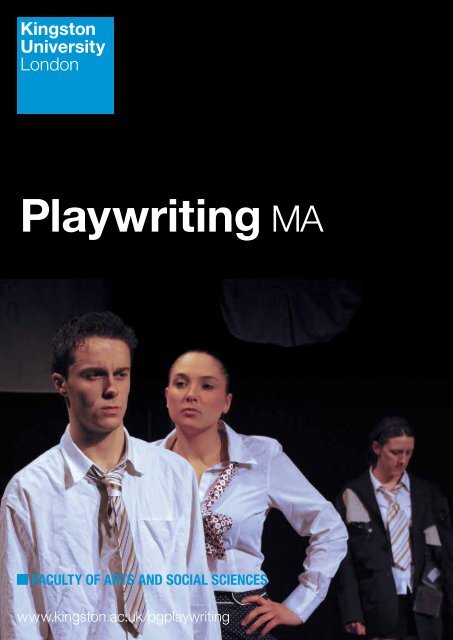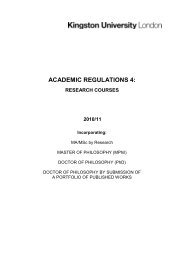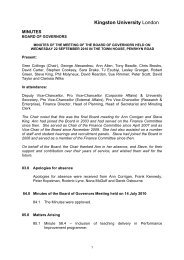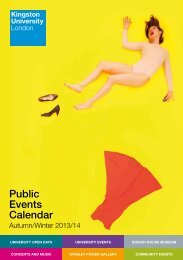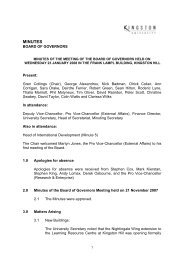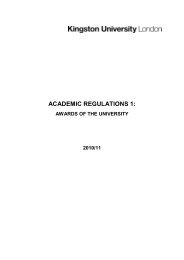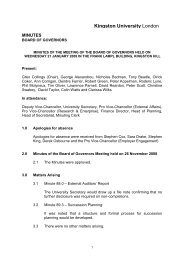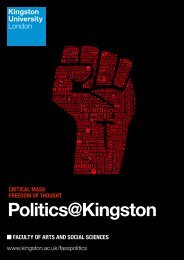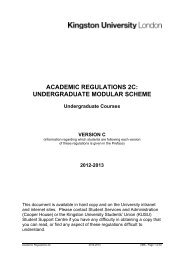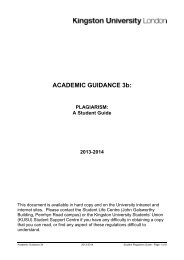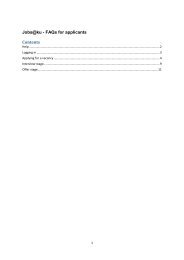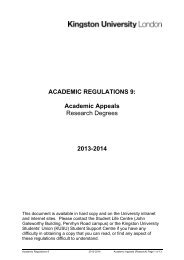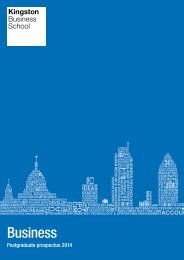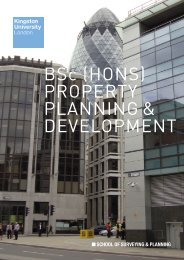Playwriting MA - Kingston University
Playwriting MA - Kingston University
Playwriting MA - Kingston University
You also want an ePaper? Increase the reach of your titles
YUMPU automatically turns print PDFs into web optimized ePapers that Google loves.
<strong>Playwriting</strong> <strong>MA</strong><br />
Faculty of Arts and Social Sciences<br />
www.kingston.ac.uk/pgplaywriting
<strong>Playwriting</strong> <strong>MA</strong><br />
About the course<br />
Course overview<br />
This course is for aspiring and experienced playwrights, performance writers<br />
and dramaturgs who are keen to establish their unique voice in response<br />
to recent innovations in contemporary theatre and performance. While<br />
the course acknowledges the continuing centrality of a particular dramatic<br />
tradition that was first articulated by Aristotle, it also recognises that once<br />
‘alternative’ forms such as visual and physical performance, live art and postdramatic<br />
theatre have equal validity in contemporary culture. We believe that<br />
writers have an important role driving such movements, and in forging the<br />
theatrical forms of tomorrow.<br />
What you will study<br />
<strong>Playwriting</strong> and theatre-making skills: teaching on this course includes a<br />
foundation in the traditional writing skills of characterisation, dramatic structure,<br />
dialogue and action. You also receive basic training in other practical skills<br />
such as design or performing in order to extend your understanding of stage<br />
craft and your abilty to collaborate with other theatre-makers. Through this,<br />
you will also be introduced to alternative approaches to theatre-making,<br />
for example through improvisation, scenography and collaboration. Your<br />
creative skills are honed through a series of practical tasks (both in class and<br />
independent), supported by guidance and feedback from your tutors and,<br />
where appropriate, peers.<br />
New writing in context: studying plays (as scripts and in performance) in<br />
the light of current debates in new writing and scholarship develops your<br />
knowledge of the playwriting ‘industry’ and the contexts in which traditions<br />
and innovations of playwriting evolve. This also equips you with the academic<br />
skills you will require to conduct your own research (for creative and/or<br />
scholarly projects) and to analyse both professional practice and your own<br />
work. These skills are developed through tutor presentations and research and<br />
analysis tasks (both in class and independent), supported by guidance and<br />
feedback from your tutors and, where appropriate, peers.<br />
• Specialist skills in playwriting in a variety of modes<br />
• Aspects of stage craft<br />
• Plays and creative methodologies, analysed in their historical, ideological and<br />
cultural contexts<br />
• Research, analysis and academic skills (including practice-as-research and<br />
reflective writing), in relation to plays and creative methodologies<br />
Support<br />
An allocated personal tutor tracks your progress and offers one-to-one<br />
tutorials at key points of the teaching year (for example, following the return of<br />
assessment marks and in preparation for your Capstone project). All Drama<br />
tutors offer office hours when they are available to meet students about<br />
specific matters or projects. Further support is provided by CASE (Centre for<br />
Academic Skills and Employability), Information Services (help with conducting<br />
research and bibliographic referencing) and the Faculty postgraduate office<br />
(timetables, assessment hand-ins).<br />
Careers<br />
You complete the <strong>Playwriting</strong> <strong>MA</strong> by writing the play which will act as<br />
your ‘calling card’ to the theatre industry. Guidance and feedback from<br />
tutors and visiting professionals helps you develop this script in a way that<br />
best represents your imagination, craft and original vision. A ‘showcase’<br />
performance in the autumn of your graduation introduces your work to invited<br />
members of the theatre industry. The course thereby optimises your position<br />
as an upcoming playwright. The course also facilitates employment in the<br />
theatre industry. Many of our early-career graduates are now employed<br />
within professional theatres including the Royal Court, the National Theatre<br />
and the Barbican, with others also working elsewhere in the cultural sector,<br />
for example at the Victoria and Albert Museum’s Theatre and Performance<br />
Galleries or as independent festival producers and artists. Graduates have<br />
also gone on to PhD study, continuing their engagement with new writing<br />
through practice-based or ‘traditional’ research. This course provides entry<br />
into higher education teaching and research.<br />
Research areas<br />
This programme emerges directly from the Drama department’s research<br />
expertise in contemporary theatre-making. Teaching staff Winsome Pinnock,<br />
Ian Brown and Colin Chambers have forged their research interests from<br />
their professional practice as playwrights and in new writing. Course leader<br />
Alex Mermikides’ recent publication with Jackie Smart, Devising in Process<br />
(Palgrave, 2010), has influenced the collaborative approach to theatre-making<br />
employed in the teaching of this course. Research in <strong>Kingston</strong>’s Drama<br />
department is based on the belief that theory and practice are interrelated,<br />
and that the best theatre practice emerges from a thorough knowledge of<br />
historical and contemporary practice and their conceptual contexts.<br />
Special features<br />
• These programmes are very practical – you will be creating short scripts<br />
from your first weeks. A series of practical projects allows you to develop<br />
advanced skills and techniques for writing for performance and to evolve<br />
your personal vision and voice as a creative artist.<br />
• You will be taught at the Rose Theatre, <strong>Kingston</strong>, giving you an insight<br />
into the day-to-day running of an important producing theatre with<br />
an exciting programme of performances and related events. You will<br />
regularly come into contact with the Rose’s creative team and the visiting<br />
companies, both formally and informally.<br />
• Tutors are highly experienced both as educators and as practitioners.<br />
The practical teaching is always relevant to the latest developments on<br />
the theatre ‘scene’.<br />
• Your academic teaching will be complemented by visiting professionals,<br />
who will keep you up to date with the latest developments in the field.<br />
• You will also enjoy a lively programme of workshops, seminars<br />
and tutorials, together with independent creative time and<br />
extracurricular activities.<br />
• The courses reflect current shifts in professional theatre-making,<br />
particularly the growing interaction between new writing and<br />
collaborative (devised) theatre and practice.
www.kingston.ac.uk/pgplaywriting<br />
Course content<br />
The course comprises of four 30-credit modules and one 60-credit module.<br />
All modules are core.<br />
Creative Practice is a practical module, designed to help you identify<br />
the sort of theatre/performance you want to make, expand your ‘toolkit’<br />
of techniques with which to realise it and inspire creative projects that you<br />
will develop over your time with us or beyond. You participate in a series of<br />
practical workshops based on significant performance traditions such as<br />
classical drama, postmodern performance and physical theatre, and their<br />
related methodologies and theory.<br />
Critical Contexts supports your ability to analyse examples of professional<br />
practice (primarily play scripts, scripts in performance and creative<br />
methodologies) in the light of current debates in new writing or related areas<br />
of scholarship. You also learn to analyse, articulate and reflect upon your own<br />
practice and identity as a playwright. The module promotes the intellectual<br />
curiosity that we believe is integral to sustaining your creative practice.<br />
The Playwright in Context engages you in the analysis of selected play<br />
texts as inspiration for your own practical experiments. The plays you study<br />
are chosen by tutors or visiting playwrights to reflect significant themes in new<br />
writing, for example ‘the playwright and social engagement’ or ‘the playwright<br />
and science’. On completion of the module, you will have developed two<br />
contrasting short plays that employ and extend techniques used in plays you<br />
have studied. Visiting playwrights have included Laura Bridgeman (There is no<br />
Name for It) and Georgia Fitch (Fit and Proper People, Adrenalin Heart).<br />
Professional Practice exposes you to professional skills such as writing to<br />
a set brief, pitching ideas, working in unfamiliar contexts, writing for particular<br />
audiences and sustaining creative collaborations. You will participate in one<br />
or more projects, working with professional practitioners towards a publicfacing<br />
outcome such as a performance. Previous projects include a production<br />
at the Camden Fringe Festival, a community play with children from a local<br />
housing estate and radical adaptation of Shakespeare. Visiting professionals<br />
have included Selma Dimitrejevic (Bush Theatre, Greyscale Theatre), Jonathan<br />
Holloway (Red Shift Theatre), the Rose Theatre company (led by Sir Peter Hall),<br />
Mitch Michelson (the Circus Space) and Moon Fool company.<br />
During the summer of your final year, you work on a Capstone Project which<br />
will usually take the form of a full-length playscript, accompanied by an essay<br />
(you may also submit a dissertation on a topic agreed with your tutor). You<br />
are guided through this process by an allocated supervisor, who will meet you<br />
at regular interval to steer your progress and give feedback on early drafts.<br />
Students are also encouraged to support each other through this period with<br />
regular group meetings and workshops. This will be the culmination of your work<br />
on the course to date, bringing together the learning and the skills you have<br />
developed. It also facilitates your entry into professional practice or further study.<br />
Teaching staff<br />
Alex Mermikides (course leader) is a senior lecturer in drama. She has<br />
worked as a dramaturg and assistant director with Lightwork theatre<br />
company, which fuses live performance and digital technologies, and has<br />
written for the stage (eg One Last Surviving at the Lyric Studio, Hammersmith,<br />
and Cuckoo at the BAC) as well as for radio (The Angel of Islington for BBC<br />
Radio 4). Alex co-edited with Jackie Smart an anthology, Devising in Process,<br />
which explores the creative processes of eight British theatre companies<br />
(published by Palgrave Macmillan in 2010).<br />
Colin Chambers is professor in drama. Formerly a journalist and theatre<br />
critic, Colin was literary manager of the Royal Shakespeare Company (RSC)<br />
from 1981–1997, where he worked with more than 80 playwrights. As well<br />
as writing theatre histories and biographies, Colin has also written, translated<br />
and adapted plays. His books include the award-winning Peggy: The Life<br />
of Margaret Ramsay, Play Agent (Nick Hern Books, 1997); The Continuum<br />
Companion to Twentieth Century Theatre ed. (Continuum, 2002); Inside<br />
the RSC (Routledge, 2004); and Here We Stand: Politics, Performers and<br />
Performance – Paul Robeson, Isadora Duncan and Charlie Chaplin (Nick Hern<br />
Books, 2006).<br />
Winsome Pinnock is a senior lecturer and a renowned playwright. Recent<br />
stage plays include: The Wind of Change; Leave Taking; A Hero’s Welcome;<br />
A Rock in Water; Talking in Tongues; Water; and One Under. Winsome has<br />
also written/adapted radio plays for BBC Radio 4: Her Father’s Daughter,<br />
Water, Let Them Call It Jazz (adaptation of a Jean Rhys short story), and<br />
Something Borrowed. In addition, Winsome has contributed to the television<br />
series Chalk Face and Eastenders and the screenplay Bitter Harvest.<br />
Winsome has won the George Devine Award and the Carlton Television<br />
‘Best play of the year’ award. Her specialist subjects include scriptwriting for<br />
theatre, autobiography, editorial process, fiction and history, prose fiction, and<br />
television and radio.<br />
Jim Reynolds is a lecturer in drama. He has worked as a youth theatre<br />
director on National Theatre Connections, staging The Ice Palace at the<br />
Kilburn Tricycle (2003) and Lorca’s The Shoemaker’s Incredible Wife at the<br />
Hammersmith Lyric (2006). He has also worked as a teacher of acting for The<br />
Harris Agency, and as a devising director for Otherwise, in a lottery-funded<br />
community project performed at the Cockpit Theatre. Jim has published on<br />
Howard Barker’s work as a director in the anthology Theatre of Catastrophe<br />
(Oberon: 2006), on acting with objects in Performance Research (2007), on<br />
Robert Lepage’s Lipsynch in Platform (2008), and on the film adaptation of<br />
graphic novels in the Journal of Adaptation in Film and Performance (2009).<br />
Jackie Smart is principal lecturer in drama at <strong>Kingston</strong> <strong>University</strong> and<br />
co-editor with Alex Mermikides of Devising in Process, which explores the<br />
creative processes of eight important British theatre companies (Palgrave<br />
Macmillan, June 2010). She has published chapters and articles on a number<br />
of other theatre and dance companies. Before taking up an academic post,<br />
Jackie founded, managed and directed productions with Theatre Cocktail, a<br />
company that focused on adapting literary texts for theatre performance and,<br />
in 2000, while in a post at Salford <strong>University</strong>, she formed Quisling, a physical<br />
theatre company, with choreographer Lisa Cullen.<br />
Ian Brown is professor and head of research in drama. He has a long career<br />
as a playwright and poet, and in the development of theatre and new writing<br />
initiatives, for example as drama director of the Arts Council of Great Britain<br />
and, more recently as chair of the Scottish Society of Playwrights. He has<br />
edited and published many books on Scottish drama and literature.
www.kingston.ac.uk/pgplaywriting<br />
<strong>Playwriting</strong> <strong>MA</strong><br />
Entry requirements<br />
To be considered for this course, you need to demonstrate one or more of<br />
the following:<br />
• A second-class degree or above, or equivalent, in a related subject<br />
(for example drama, theatre studies, performing arts, creative writing,<br />
English literature)<br />
• Experience of dramatic writing (please supply up to five pages of<br />
a playscript)<br />
• Work experience in a professional theatre<br />
• International students are required to have an IELTS score of 6.5, with 7.0 in<br />
writing, or an equivalent qualification.<br />
Prospective applicants are encouraged to meet the course leader prior to<br />
making their application. Eligible applicants are usually invited to an interview<br />
(phone or Skype interviews for overseas applicants).<br />
Duration<br />
One year full time or two years part time<br />
Assessment<br />
Formative assessments take the following forms:<br />
Creative Practice: play scripts<br />
Critical Contexts: academic essay<br />
Playwright in Context: play scripts and short essay<br />
Professional Practice: portfolio of creative tasks including a play script<br />
Capstone Project: full-length play script and essay OR dissertation<br />
Attendance/delivery<br />
This course is taught in the evenings (usually 5–8pm) with full-time students<br />
attending two classes a week and part-time students attending one class a<br />
week between late September and early May. Occasional extra sessions (for<br />
example workshops, lectures, theatre visits and tutorials) will be scheduled<br />
as part of the teaching programme, particularly on the Professional Practice<br />
module. During your final summer (from May to September), supervisory<br />
meetings and peer-support workshops are arranged on a more flexible basis.<br />
Expect to spend at least 28 hours a week (full time) and 14 hours a week (part<br />
time) on independent writing, reading and research tasks. The workload tends<br />
to peak at assessment points (usually January, May and September). As the<br />
January and May assessments may include group-created tasks, additional<br />
meetings/rehearsals may take place at the Rose Theatre or the <strong>University</strong><br />
outside regular teaching times.<br />
Please contact the postgraduate admissions office for further details.<br />
Location<br />
Teaching takes place at the Rose Theatre, <strong>Kingston</strong> and at the Drama<br />
department of <strong>Kingston</strong> <strong>University</strong> (Penrhyn Road campus), which are<br />
about 10 minutes walk apart. Both the <strong>University</strong> (<strong>Kingston</strong> or Surbiton<br />
train stations) and the Rose Theatre (<strong>Kingston</strong> train station) are within the<br />
London travel-pass zone, are easily accessible from London (25 minutes<br />
from Waterloo) and surrounding areas such as Surrey and Middlesex.<br />
Further information<br />
Contact details<br />
Please contact the Faculty’s Admissions Office for an application form<br />
or with any further queries.<br />
Admissions Office (Postgraduate Courses)<br />
Faculty of Arts and Social Sciences<br />
<strong>Kingston</strong> <strong>University</strong><br />
Penrhyn Road<br />
<strong>Kingston</strong> upon Thames<br />
Surrey KT1 2EE<br />
T: +44 (0)20 8417 2361/2378<br />
F: +44 (0)20 8417 2292<br />
E: fasspostgrad-info@kingston.ac.uk<br />
www.kingston.ac.uk/pgplaywriting<br />
HS(13.090)L


